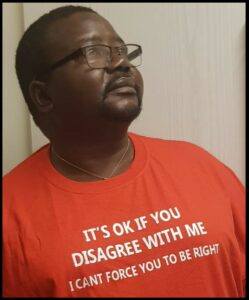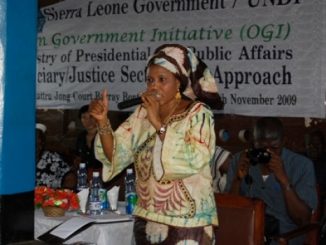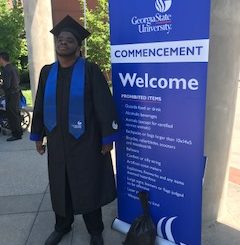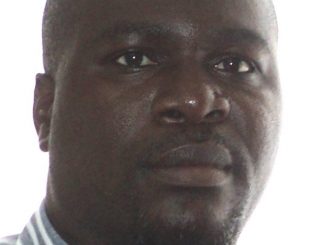
Freedom of Speech and the Paradox of the Separation of Powers.
Rightly or wrongly, President Bio has had and continues to have his fair share of criticisms from the public, the media and his political opponents. Winston Churchill once said that “criticism may not be agreeable but it is necessary. It fulfils the same function as pain in the body. It calls attention to an unhealthy state of things”. Others believe that the price of leadership is criticism. “A great leader never fears criticism and welcomes them with openness and love as if they are the beauty of the journey” (D. Mridha). If these quotes or adages are anything to go by, it means that leaders need thick skins to brush off criticisms. It could also mean that though undesirable, they need criticisms to serve as barometers and thermometers of themselves and their subjects. By implication, it means that if one cannot take such heat, they should stay out of the kitchen.
Honourable Sengepoh Solomon Thomas, the Speaker of Sierra Leone Parliament recently banished a prominent journalist, Mohamed Tejan Mansaray from the precincts of the Sierra Leone parliament until further notice. And the Hebrew Bible (Old Testament) teaches us that Solomon was a wise man. It might sound plausible to conclude that King Solomon has banished his subject based on some his renowned wisdom. According to King Solomon, Mohamed’s form of journalism is not journalism. He has singlehandedly “taken upon himself to be an opposition to whatever parliament does”. Upon close inspection, is King Solomon suggesting that Mohamed has not been constructive in his criticism or has become the mouthpiece of the opposition party?
At this stage of the debacle, it would be reckless to make sweeping conclusions in the absence of the facts and details. This is especially so, if one is writing from thousands of miles away from the scene of the “crime”. It is therefore difficult to give a forensic overview of matters. Nevertheless, it should not stop us from looking at some of the broader issues at hand here. Firstly, it brings into question, one of President Bio’s most vaunted and cherished accomplishments of his tenancy at State House. Say whatever you want about President Bio, but he signed the amended Public Order Act 1965(POA), which effectively repealed the 59- year- old seditious libel section that criminalised free speech. Interestingly, it was the SLPP, under former Prime Minister Albert Margai, who introduced the Public Order Act 1965 in the first place. So, it felt like poetic justice for an SLPP administration to get rid of such foul laws.
Is President Maada Bio’s amendment of the criminal libel law at risk?
When President Bio signed the amendment of the POA, many saw this as his personal commitment to one of the pillars of democracy, the right to free speech. That does not mean that he had since not had a sizeable amount of criticism for clamping down on free speech. We know that previous governments had promised and failed to make amendments to the POA. Previous governments had used it to muzzle and silence dissent and opposition voices. They saw it as necessary hammer on the anvil of governance. It is therefore not surprising that many critics will see King Solomon’s ruling as an attempt to revisit POA by stealth. But why would the Speaker of Parliament take such a unilateral and apparently arbitrary decision? This brings to mind the issue of Free speech.
It is undeniably true that the concept of freedom of speech remains paradoxically ironic or ironically paradoxical. Lest we forget, Freedom of speech belongs to those who own it. It is one thing to express our right to free speech, but an entirely different case to take responsibility for it. As we know, rights come with responsibilities. If we are happy to express our rights to freedom of speech, we should be ready to accept the responsibilities that come with it. There are said to be five core principles of journalism, which include truth and accuracy, independence, fairness and impartiality, humanity and accountability.
No one can always guarantee the truth but as journalists, getting the facts right and striving for accuracy is vital. As humans, journalists belong and affiliate. Where such conflict of interests exist, journalist are expected to declare such to their editors. This is because, the voices of journalists should be independent of such persuasions. There is at least two sides to every story. Where possible, journalists are expected to present fair, impartial and balanced sides to every story. The humanity in journalists require that they do no harm. As such, they should be aware of the impact of their words and images on the lives of others. Finally, and as professionals, journalists should possess the ability to be held accountable themselves. When they write about people and issues, the crux of their pieces is not only to tell a story but to hold others to account. Should such accountability not be extended to journalists as well?
Now that we have looked at the core principles, how many journalists in our country can truthfully say that they follow these principles? Since the advent of the information super highway called internet, and especially social media platforms like X, Facebook, Instagram, WhatsApp etc., the credibility of journalism and the media in general has taken a significant battering. The notion, “don’t believe everything you read” has never been so appropriate. Recently, some bloggers and other social media “influencers” were up in arms because another blogger was arrested while in a reality TV bubble. A lot of people described the arrest as a crime against free speech.
According to social media, she was alleged to have rained personal expletives against President Bio and his wife Fatima. So, how many people find it justified that the President and his wife deserved to get such an abuse? Howe many people see such alleged insults as a demonstration of free speech? How many think that in journalistic terms, the core principles were demonstrated here? Was the alleged blog meant to do no harm? If journalists hold others to account, should they be held to account too? If they are asked or held to account, is that an abuse of the freedom to speak? Does freedom of speech come with responsibility? Does the abuse of the right to free speech put at risk the whole concept of free speech?
However, that does not mean that those who misuse the right to free speech don’t have similar counterparts. On the other side, there are others and especially in government and public circles, who are allergic to free speech. Their antagonism for free speech can be anaemic. They see freedom of speech as a spanner in the works of their despotic and autocratic tendencies. They just can’t take criticism because they possess some misguided self -confidence in their infallibility. Those who despise or reject criticism usually harbour dark hubris within. However, if any criticism is to earn its credibility, then such criticism should be “constructive”.
So, the Speaker of Parliament bans Mr Mansaray from parliament for crimes against the Parliament of Sierra Leone. Some of us are not sure whether the Speaker has such unilateral powers to do so as Land Lord of Parliament Building or as the Speaker of the Nation. The last time I checked, the three branches of our democratic government are the legislative, judiciary and executive. I checked again and found out that our parliament, for which Honourable Solomon is the head, belongs to the legislative branch of government. As a professional, one would expect Mr Mohamed Tejan Mansaray to belong to a professional body like the Sierra Leone Association of Journalists (SLAJ).Therefore, one would expect SLAJ to be accountable to the Independent Media Commission (IMC), as the guardian of the Fourth Estate and the body established to oversee and regulate the media industry in the country. The IMC, in promoting media freedom and professionalism is also tasked to ensure ethical journalism and protect the public from harmful and misleading media content.
So, if the land lord of Parliament Building feels that one of his lodgers has violated the terms of his temporary tenancy, shouldn’t our esteemed Speaker of Parliament not refer the matter to the professional body (SLAJ) and the custodian of the media industry (IMC) in the first place? Since the accusation is not a civil and personal matter between Honourable Solomon and Mr Mohamed Mansaray, shouldn’t this be dealt with by the other arm of government? Like I said, we might not know the extent of the long arms of the law that is at the disposal of the Speaker, and we might not be privy to the extent of Mr Mansaray’s “crimes”, but should Honourable Solomon be the judge and jury in this case? We know that the Biblical Solomon did not have a jury in his courts, but where does that leave our concept of the separation of powers, one of the benchmarks of our democracy? Where does that leave President Bio’s amendment of the Public Order Act, when the same parliament that amended the Public Order Act seems to apparently undermine its basic tenets? Is that political patricide?
This is not an apology for Mr Mansaray or others in his industry. We are aware of how standards in journalism have dropped across the world. In Sierra Leone and thanks to political and partisan antagonism, yellow journalism has been the modus operandi. While we are losing the ability to see the good in others, our penchant to attract and promote chaos has largely been fuelled by a handful of individuals masquerading as journalists, bloggers, attention seekers (influencers), etc. Free speech is not a privilege but an organic necessity in a great society. However, if we are to protect our rights to free speech from the despots, autocrats and bullies, we should also be ready to protect freedom of speech from free speech. This means that we need to own the freedom of speech in order to protect our right to free speech. We should exercise both the rights and responsibilities of the freedom of speech.
So, should the parliament that gave us back our right to free speech take it back because of one unfavourable angle of storytelling? Should we throw away the books on separation of powers, which is supposed to give our democracy some buoyancy in the political ocean? Should the parliament, under President Bio which saved us from shackles of the POA be used now as the political abattoir for the silence of the lambs? Should some of our journalists go back to the drawing board and brush up on the five core principles of journalism? Should our journalists guard against the misuse of our hard earned rights to free speech? Do we actually have freedom of speech and the rights to free speech in Sierra Leone?
No matter what happens, the concept of Freedom of speech, the right to freedom of speech, and the need to promote and protect the freedom of and right to free speech is one tough balancing act. It is up to every individual to own, promote and protect it from abuse by those who want it, and from abuse by those who think they own it. If we fail to own, promote and protect our freedom of speech, there could be no guarantees for freedom after speech. History has taught us that freedom of speech isn’t just about speaking. It is also about listening. Thanks to Allah, I am not a journalist. I just think aloud.
Don’t forget to turn the lights out when you leave the room.
Abdulai Mansaray.





Leave a Reply